Student Profile: Shyrie Patel10 min read
Advocating for Healthcare From Personal Experience
This profile is one in a series highlighting School of Dentistry alumni, donors and students.
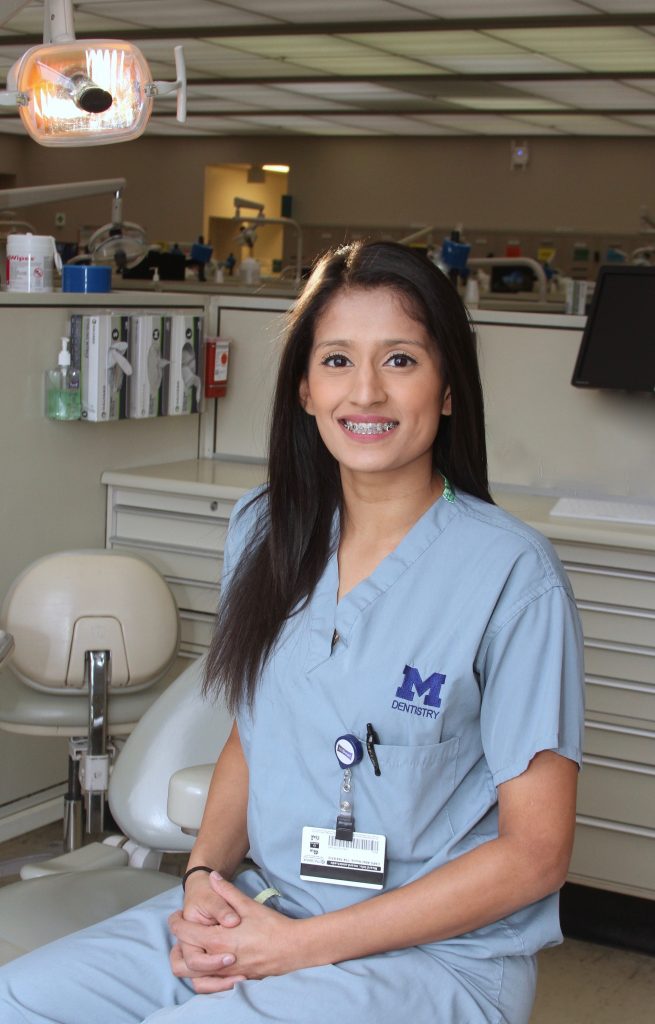
Shyrie Patel is just a few months away from earning her Doctor of Dental Surgery degree, but she would prefer that you not congratulate her on becoming a dentist. Instead, on graduation day next May, wish her well on her journey to becoming a “healthcare professional.”
The distinction is more than just semantics for Patel. It’s informed by the personal experiences of her family as she grew up in England, including a period of time when they were so poor that the only healthcare treatment they received was in hospital emergency rooms. During those few encounters, Patel was struck by how the healthcare system dealt with putting out fires – treating only the immediate, narrow health issue – rather than conducting a thorough review of the patient’s overall health and lifestyle.
Now, as she finishes her last few months at the University of Michigan School of Dentistry, her aspiration is to become part of an interprofessional healthcare team, increase public health awareness and engage in healthcare policy. Her next step in that plan is to secure a spot in a one-year General Practice Residency (GPR) program at a U.S. hospital in order to increase her expertise with various dental specialties and related professions. She’s currently in the middle of an interview tour that is taking her to several prominent academic hospitals from coast to coast.
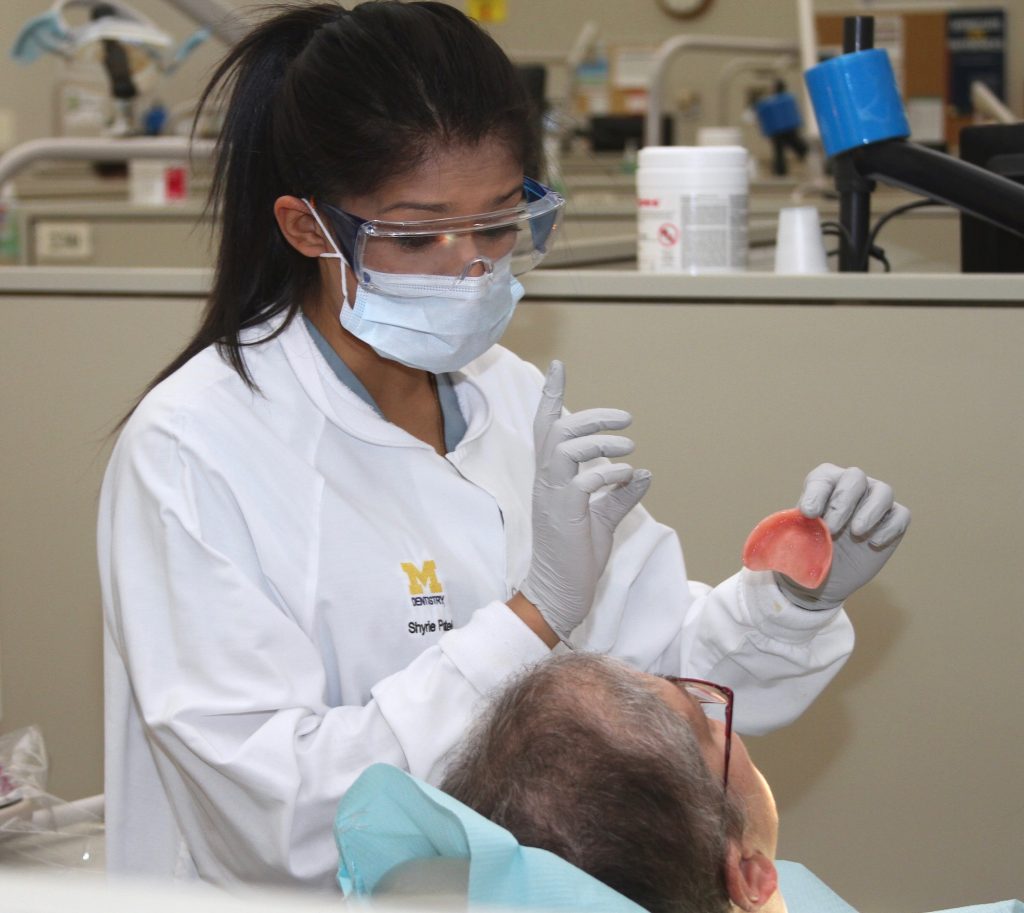
Her educational success so far is a remarkable story that emerges from her background growing up in a working-class family in Leicester, the English city 100 miles northwest of London that is often associated with its famous soccer team, the Leicester City Football Club. Patel’s father was born in Africa and, as a teen, was sent to live with relatives in London. He later visited India where he met his wife, who returned with him to London. The couple eventually moved to Leicester with their two children – Shyrie and her older brother.
Patel said neither of her parents came from educated families, so they depended on random blue-collar jobs to support their immediate family. For a year and a half of her childhood, the family lived in homeless shelters and they once spent a couple of nights on the streets without a place to stay. They eventually qualified for England’s public housing system known as council houses, which steadied the family life.
Patel traces her interest in dentistry and healthcare to those times in her childhood when she realized that the quality of healthcare is not equal, or equally accessible, across society. Because of her family’s relatively low standard of living, there was more emphasis on putting food on the table than making sure everyone’s health was sound. Her father’s dental health was a prime example. His teeth were in such poor condition that, more than once, a tooth broke and popped out while he was eating.
In the personal statement she wrote in applying to GPR programs, Patel described her family’s health status this way: “Healthcare was not accessible and only sought when urgent. In total, as a family, we had six emergency healthcare visits in two years, yet not once was my father’s dentition evaluated. There seemed to be a lack of integrated healthcare to provide for a patient comprehensively. My father, a man who hadn’t even reached age 30, had lost several of his teeth. It is a sight I can never forget, and one that drove me to dentistry specifically.”
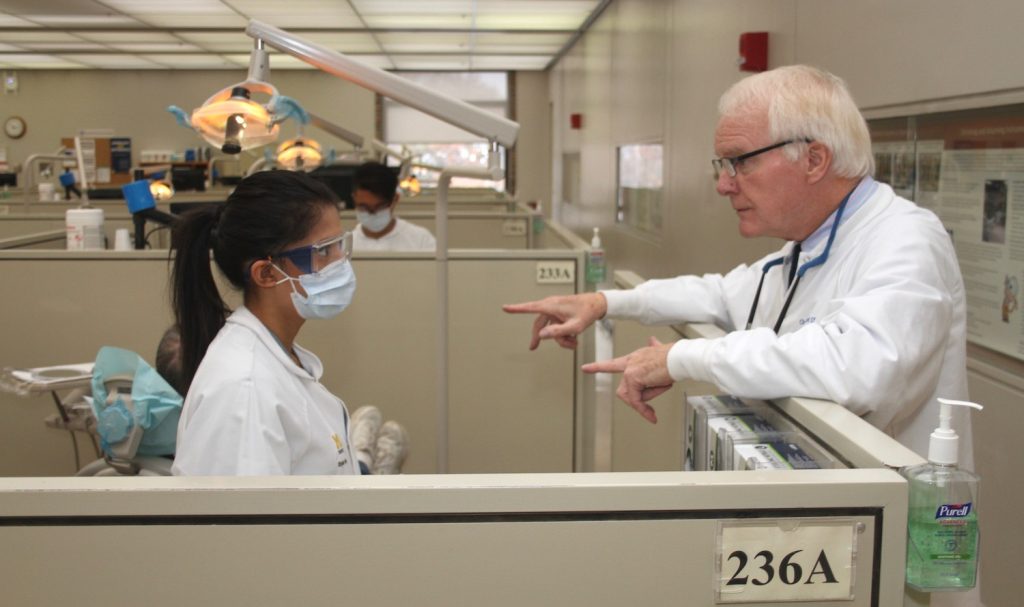
Patel’s interest in healthcare led her to shadow doctors and dentists in high school, even as she was starting a property management business with her brother to help the family’s financial stability. By the time Patel graduated from high school, her family had obtained the necessary immigration approvals to join her mother’s parents, who had settled in the United States many years earlier and worked as housekeepers at a hotel in Kansas. While her parents joined the hotel business in the Midwest, Patel enrolled at the University of Massachusetts at Amherst, majoring in biochemistry and molecular biology. “By then, I wanted to do something to better healthcare,” she said. “I wanted to learn to do one specific thing properly – dentistry – and make my mark there, and then branch out. I chose dentistry after learning more about public health initiatives and how I could eventually go into public health, public policy and that side of things.”
One of the dental schools she applied to was U-M because her brother completed his undergrad degree at U-M while she was at UMass. He loved his time in Ann Arbor and suggested that the highly regarded dental school would be a good choice for his sister. During her interview and admissions process, Patel confirmed that U-M was the best fit of the dental schools she considered, plus she would be back near her brother, who was starting law school in Lansing. Patel’s first year at the dental school, however, proved to be a rough transition. In what little spare time she had from her studies, she was still operating the family property management business, which had expanded to include several hotels across the country. Her grades suffered and she began to question her choice of dentistry.
She and her brother, who by then had changed career directions and was in medical school in Tennessee, needed to make changes. “Now the business runs itself, but at that point we had to figure out how to make sure that it runs, to make sure our family is stable, because we didn’t want to regress back to where we were,” Patel said. “And we also had to appreciate that we have our own careers to focus on. So that was a lot of figuring out how to balance things.” During her second year, she found that balance, her grades improved and her love of dentistry returned.
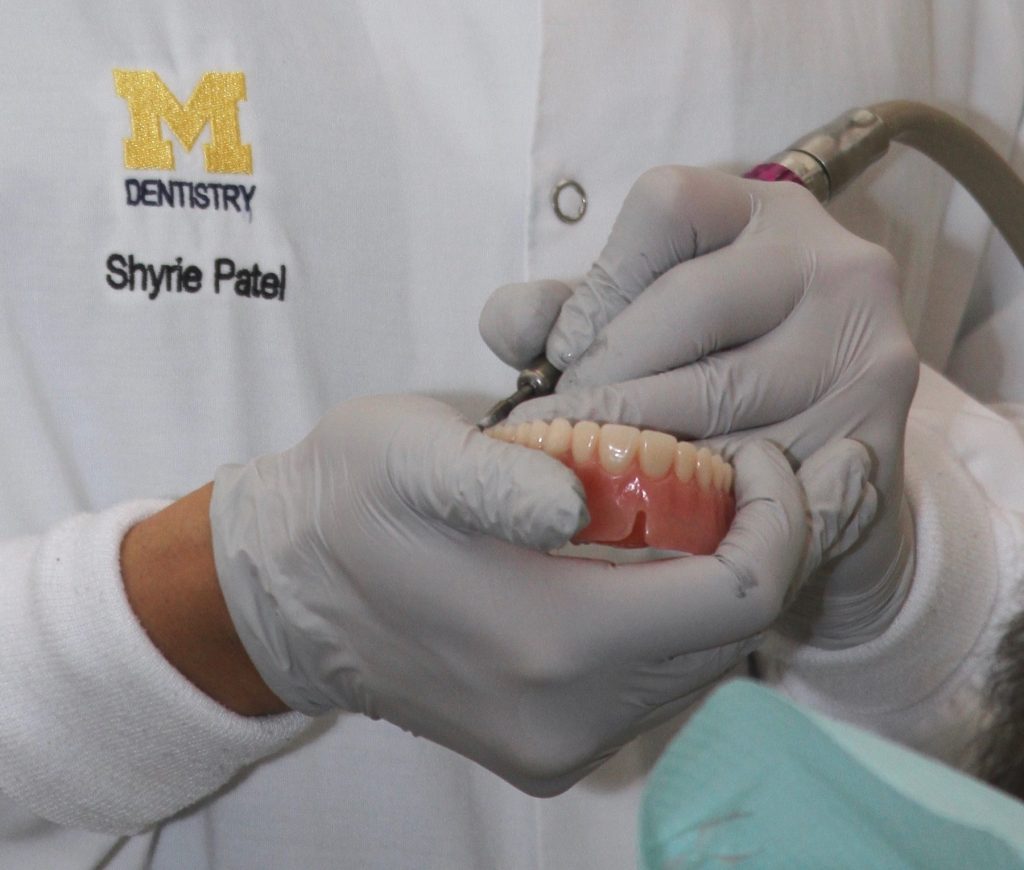
On a recent Wednesday morning, Patel showed unrelenting patience as she worked closely with a female patient in the “Green” clinic on the second floor of the dental school. After many appointments over the last year, Patel was delivering a complete upper denture for the woman, who also had a partial lower denture. Fitting new dentures is an often laborious process of having the patient try the fit, then removing the denture to make adjustments, and repeating until the patient is comfortable. Patel made probably 20 micro adjustments before the patient and provider declared success. Patel called over the supervising faculty member to sign off on the work, but the patient then asked for more adjustments. Patel listened intently to the faculty member’s suggestions, then began the process again, this time requiring only a few quick modifications.
Working closely with faculty has been a surprisingly positive experience during her dental school tenure, Patel said. “The best part of dental school is the fourth year when you are in the clinic full-time. Every single day you walk in with a different faculty member. They’ve gone through different training. They’re from all over the world. You have so many people helping you learn. And they also respect you more as a colleague than a student. As opposed to, ‘I’m the teacher, you’re the student.’ I think that’s the best part because I never expected it. It was really shocking in a pleasant way.”
Dental school remains difficult, mostly because it requires a laser focus on dentistry at the expense of outside activities. For example, Patel is an expert in classical Indian dance but no longer teaches the artform she learned during lessons in England and during family trips to India. She also earned a black belt and taught Shukokai karate in high school, but dropped that athletic endeavor in favor of academics. She played recreational league soccer her first year in dental school, but that, too, was put aside for academic time.
Her non-study time in dental school has involved organizations including the American Association of Public Health Dentistry, the American Dental Education Association and the Alpha Omega dental fraternity. She has been president of all three, among other officer positions. As part of the Bridge of Disciplines program within dental school, she participated in a Dental Day project at the Comprehensive Speech and Therapy Center in Jackson, Mich. Dental students used games and dental equipment to acclimate patients on the autism spectrum with dental office routines so that their real appointments would be less stressful. She’s also been involved in research with faculty members Drs. Kenichi Kuroda and Geoffrey Gerstner.
With graduation only about four months away, Patel has begun envisioning her professional future based on this DDS foundation. It will include lifelong learning, multidisciplinary experiences and incorporating many perspectives from across the many healthcare fields. “Be it as a homeless person in need, a volunteer, a health professional student or a patient,” she wrote in her personal statement. “Through my exploration, I continue to recognize the need for providers who work in an interdisciplinary manner to 1) increase health awareness; 2) promote public healthcare; and 3) make a positive change to healthcare policy.”
Patel doubts she will engage in private practice full-time, perhaps starting part-time at first as she finds her niche in public health. “Eventually from there I want to move up to policy and education and try to make a change in how the healthcare system works,” she says. “That’s the end goal – trying to figure out how my part plays in the whole system.”
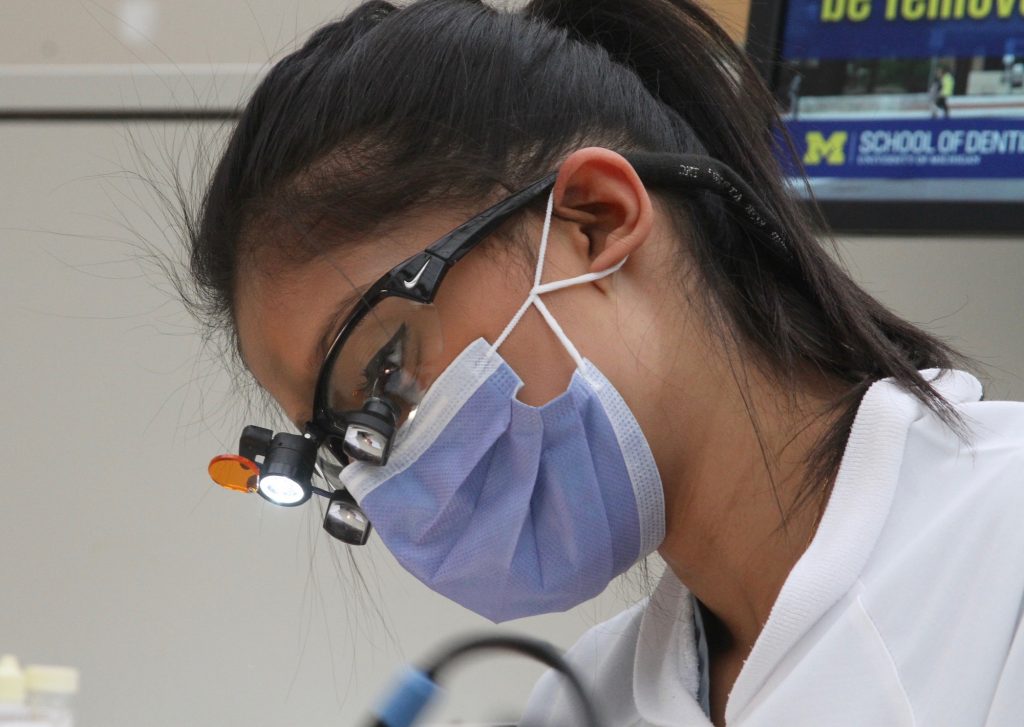
###
The University of Michigan School of Dentistry is one of the nation’s leading dental schools engaged in oral health care education, research, patient care and community service. General dental care clinics and specialty clinics providing advanced treatment enable the school to offer dental services and programs to patients throughout Michigan. Classroom and clinic instruction prepare future dentists, dental specialists and dental hygienists for practice in private offices, hospitals, academia and public agencies. Research seeks to discover and apply new knowledge that can help patients worldwide. For more information about the School of Dentistry, visit us on the Web at: www.dent.umich.edu. Contact: Lynn Monson, associate director of communications, at [email protected], or (734) 615-1971.
